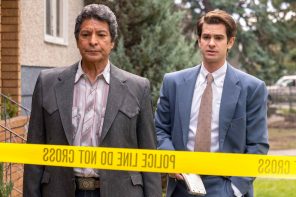Patricia Miller’s recent RD posts critiquing the “Francis Effect” and characterizing the pope as “more like a mascot than a leader” got me thinking about how Mormons see their prophets.
There’s an old saying: “Catholics say the pope is infallible but don’t really believe it; Mormons say the prophet is fallible but don’t really believe it.”
To prove at least the Mormon half of that theory, try an experiment suggested by Michael J. Stevens, who holds a PhD in organizational behavior and is chair of the Department of Business Administration at Weber State University. As part of a priesthood lesson one Sunday, Stevens wrote the following statement on the board:
The prophet cannot err when making official pronouncements of faith and morals.
Go ahead: Like Stevens, ask a few Mormons you know if they agree with this statement. Chances are good that you’ll get results much like his: All but one man in the priesthood class said, “Oh, yeah. That’s true. That’s what we believe.”
When, at the end of class, Stevens admitted that this was his paraphrase of the doctrine of infallibility as explained by a Catholic encyclopedia , they said something like, “Oh, well, we don’t believe that. That’s popish nonsense.”
What Mormons have instead of infallibility is “instrayability,” a coinage by Stevens to sum up the belief that “the prophet can never lead the church astray.” It comes from remarks made by President Wilford Woodruff in 1890 to convince Latter-day Saints that giving up the practice of polygamy didn’t mean the church had fallen into apostasy:
The Lord will never permit me or any other man who stands as President of this Church to lead you astray. It is not in the programme. It is not in the mind of God. If I were to attempt that, the Lord would remove me out of my place, and so He will any other man who attempts to lead the children of men astray from the oracles of God and from their duty.
As Stevens points out, it amounts to the same thing as infallibility, even though Mormons strenuously reject any official doctrine of infallibility.
Instead, they gravely admonish each other that “When the prophet speaks, the debate is over” and “When our leaders speak, the thinking has been done”—even though President George Albert Smith himself said in 1945 that doesn’t represent the church’s real position . But the phrases are just too catchy to abandon, especially when you have leaders like Ezra Taft Benson, who would eventually become president of the church, exhorting members in 1973 to
live the gospel fully, and may we recognize the infallibility of God’s inspired word—whether by his “… own voice …” or the “voice of [his] my servants, it is the same.” (D&C 1:38.) (emphasis added)
Part of the problem is that so many men make so many pronouncements in so many solemn assemblies. It’s not just that the current prophet gets up in General Conference and says things that immediately assume a quasi-canonical status because of hisstatus. It’s that dozens of other men proclaimed as God’s chosen servants—and thus his proxies—do the same thing.
And some of those men sometimes say deeply objectionable, foolish things. An example is Tad R. Callister’s recent talk about sexual morality. Or you could look at pretty much anything Boyd K. Packer has said during his tenure as a general authority. (Raise your hand: how many of you know someone for whom the last straw, the thing that finally got them to stop going to church, was Packer’s October 2010 Conference talk about how homosexuality is not an “inborn tendency”—changed in the reprint of the talk to “temptation”—but an “impure and unnatural” choice that can be overcome, because God would never curse someone with homosexuality?)
The honesty, humility and integrity demonstrated by Elder Deiter F. Uchtdorf when he admits “there have been times when members or leaders in the Church have simply made mistakes. There may have been things said or done that were not in harmony with our values, principles, or doctrine” is one reason he is respected and trusted by so many in and outside the church.
But Stevens asks what we should do with that admission. “Now that Uchtdorf has opened that door, I want to walk through it and discuss those mistakes,” he says, noting that the mistakes the church acknowledges tend to be well in the past—but current and on-going mistakes need to be admitted and corrected, both for the health of the church as an institution and for the health of its members as individuals.
“Utah has the highest rate in the country of online porn consumption, mental illness, and passive-aggression,” he says. “For a state to lead in any one of those pathologies is enough for me to step back and say, ‘Hey, what’s going wrong here?’ But for Utah to lead in all three markers is persuasive evidence that we have serious things wrong in our culture.”
Part of the pathology is summed up by Dallin H. Oaks’s imperious declaration that “It’s wrong to criticize leaders of the church, even if the criticism is true.” A culture in which obedience and acquiescence are the only acceptable behaviors and leaders cannot be held accountable by the people they lead isn’t a healthy one, spiritually, intellectually, or morally.
The church wants to have it both ways: it wants to reject the doctrine of infallibility so that it doesn’t look quite so foolish when it changes its mind on something—say, for instance, the moral inferiority of an entire race , or the absolutely fundamental belief that those admitted to the Celestial Kingdom will be exalted as gods equal to the God we worship now. But it also wants members to behave as if leaders—not just the one man who is the prophet, but pretty much all men who give speeches in General Conference or talks reprinted in the Ensign—are infallible:
One of the sneaky ploys of the adversary is to have us believe that unquestioning obedience to the principles and commandments of God is blind obedience. His goal is to have us believe that we should be following our own worldly ways and selfish ambitions. This he does by persuading us that “blindly” following the prophets and obeying the commandments is not thinking for ourselves. He teaches that it is not intelligent to do something just because we are told to do so by a living prophet or by prophets who speak to us from the scriptures.
Talks like this are meant to make people question themselves, not their leaders, when they encounter problems in the church’s beliefs and practices. Any doubt, debate or question is perceived as criticism—which we know from Oaks is “wrong.” It’s a way to intimidate people into silence and submission, and censure them as unrighteous, divisive and contentious if they dissent in word or deed.
If members cannot ask questions of their leaders, it’s well past time for the all-male hierarchy to ask some hard questions of itself. Each generation of men may be able to persuade a great many people that whatever mistakes were made, they were made in the past by someone else, and the men who tell them today how to live their lives should be obeyed without question. But as Stevens’ points out, at some point, the LDS church must confront the fact that “the evidence of our pathology is right there for anyone to Google.”
I invoke often the church’s shockingly poor retention rates. There are many ways to interpret their significance, and one is as evidence that for a great many Mormons, “astray” is exactly where our leaders have led us, which is why we won’t follow them.




